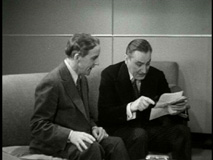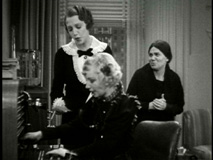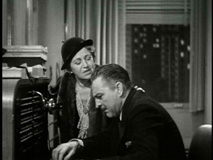Counsellor at Law (William Wyler) 1933
 Though William Wyler’s stupendously entertaining legal
melodrama Counsellor at Law, was based on a stage play, and takes place
entirely in one large lawyer’s office, it has an undeniably rich sense of
atmosphere. Wyler uses the opening scenes to establish the location that the
eventual drama unfolds in before he introduces George Simon (John Barrymore),
the legal eagle whose fear of disbarment forms the picture’s dramatic core,
into that tumultuous environment. These scenes, with their rapid-fire dialogue
and rather quick cutting, feel like an especially impressive plate-spinning act
for Wyler to orchestrate, but he never misses a beat while accumulating
ambiance. Without ever overlapping the dialogue or connecting the rooms in the
office with tracking shots, he manages to create an Altman-esque sense of space
and chaos. Events and interactions continue to occur with such speed that their
interconnectivity becomes completely believable. By the time Wyler finally
introduces the main plot elements, roughly a half-hour into the picture’s
81-minute running time, we understand just how much depends on Simon, even if
Barrymore’s wisely restrained performance isn’t often willing to reveal that
his character is aware of it.
Though William Wyler’s stupendously entertaining legal
melodrama Counsellor at Law, was based on a stage play, and takes place
entirely in one large lawyer’s office, it has an undeniably rich sense of
atmosphere. Wyler uses the opening scenes to establish the location that the
eventual drama unfolds in before he introduces George Simon (John Barrymore),
the legal eagle whose fear of disbarment forms the picture’s dramatic core,
into that tumultuous environment. These scenes, with their rapid-fire dialogue
and rather quick cutting, feel like an especially impressive plate-spinning act
for Wyler to orchestrate, but he never misses a beat while accumulating
ambiance. Without ever overlapping the dialogue or connecting the rooms in the
office with tracking shots, he manages to create an Altman-esque sense of space
and chaos. Events and interactions continue to occur with such speed that their
interconnectivity becomes completely believable. By the time Wyler finally
introduces the main plot elements, roughly a half-hour into the picture’s
81-minute running time, we understand just how much depends on Simon, even if
Barrymore’s wisely restrained performance isn’t often willing to reveal that
his character is aware of it.
 Once the plot of the film becomes apparent, the
atmosphere-building stunt ends, but the mood that has been created doesn’t go
away. The emotional attitude shifts a bit, but the hectic, frazzled feel of the
film hardly lets up. The comic touches that dominate the earliest scenes of the
film grow more and more infrequent, but they’re replaced with dread and
anxiety. Wyler begins cutting less often and sometimes uses a zoom shot to punch
up certain dramatic moments, and that lack of visual ostentation allows the
performances of the excellent ensemble to shine. Barrymore’s self-control in
the lead role anchors the rest of the cast, forcing them to tone down their
mannerisms a little, so that even the less thoroughly envisaged roles have a bit of
credibility.
Once the plot of the film becomes apparent, the
atmosphere-building stunt ends, but the mood that has been created doesn’t go
away. The emotional attitude shifts a bit, but the hectic, frazzled feel of the
film hardly lets up. The comic touches that dominate the earliest scenes of the
film grow more and more infrequent, but they’re replaced with dread and
anxiety. Wyler begins cutting less often and sometimes uses a zoom shot to punch
up certain dramatic moments, and that lack of visual ostentation allows the
performances of the excellent ensemble to shine. Barrymore’s self-control in
the lead role anchors the rest of the cast, forcing them to tone down their
mannerisms a little, so that even the less thoroughly envisaged roles have a bit of
credibility.
 Simon’s crisis isn’t really a moral or ethical one
since he regrets nothing he’s done. Mostly, he's just afraid of the
consequences that would arise if his misdeed was made public. Simon's actions, though technically illegal,
are wholly sympathetic, but that makes his situation a bit less compelling than
it might otherwise have been, even as it allows us to root for him. Still,
there’s not enough breathing room in the film for things to grow the least bit
moldy. Since it zips by as it does, perhaps the audience would never have been
able to find a moment to ponder issues such as morality anyway. Since Counsellor
at Law is as compactly conceived as it is (the film never sets foot in a
courtroom), though, one can’t rightfully complain about what it isn’t. As a
specific, direct adaptation of a better than average play, it could scarcely be
more efficient.
Simon’s crisis isn’t really a moral or ethical one
since he regrets nothing he’s done. Mostly, he's just afraid of the
consequences that would arise if his misdeed was made public. Simon's actions, though technically illegal,
are wholly sympathetic, but that makes his situation a bit less compelling than
it might otherwise have been, even as it allows us to root for him. Still,
there’s not enough breathing room in the film for things to grow the least bit
moldy. Since it zips by as it does, perhaps the audience would never have been
able to find a moment to ponder issues such as morality anyway. Since Counsellor
at Law is as compactly conceived as it is (the film never sets foot in a
courtroom), though, one can’t rightfully complain about what it isn’t. As a
specific, direct adaptation of a better than average play, it could scarcely be
more efficient.
* * * *
11-19-02
Jeremy Heilman